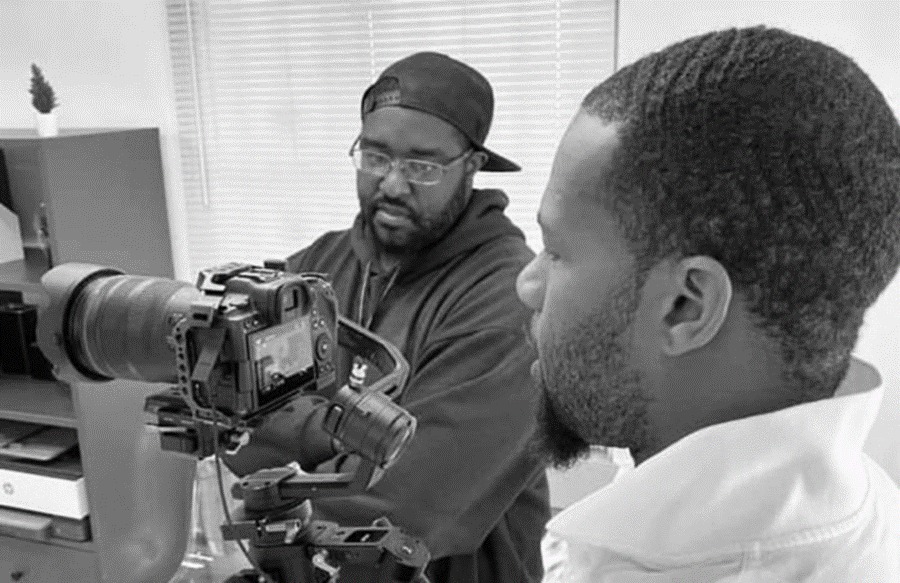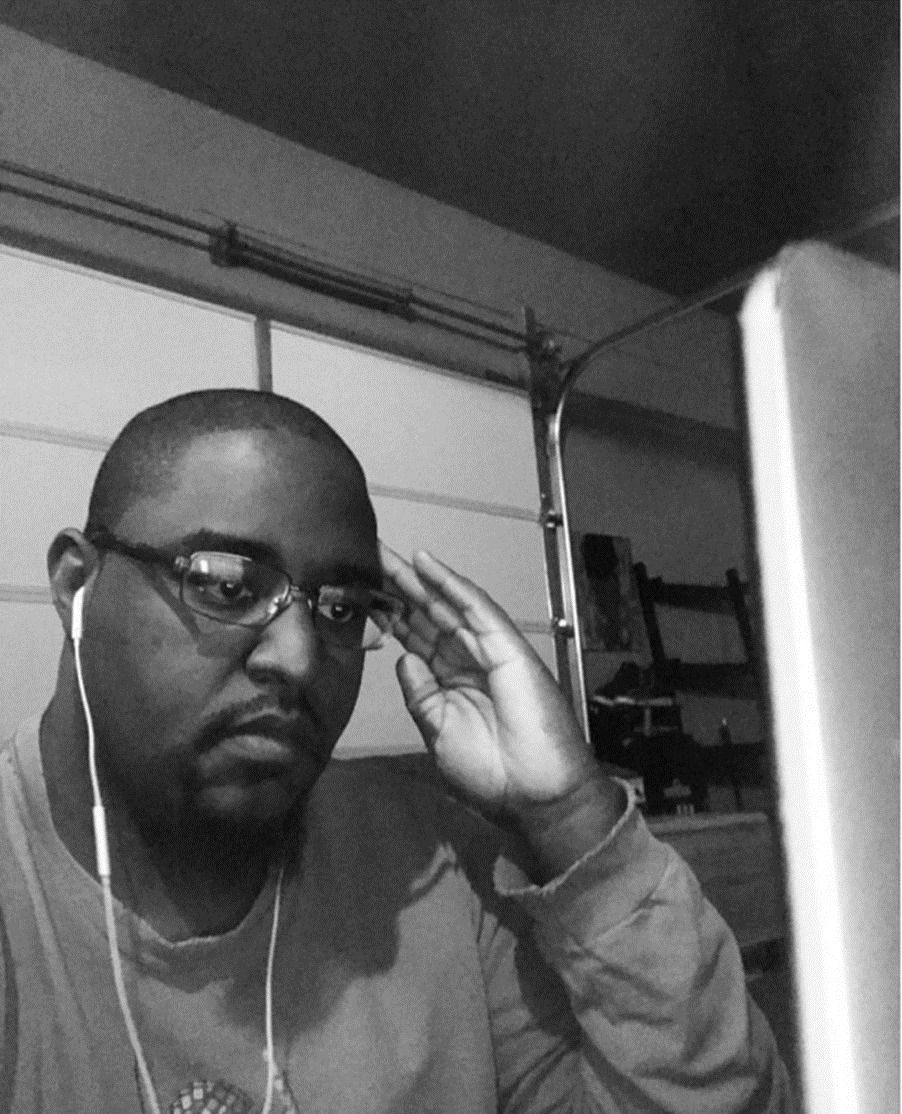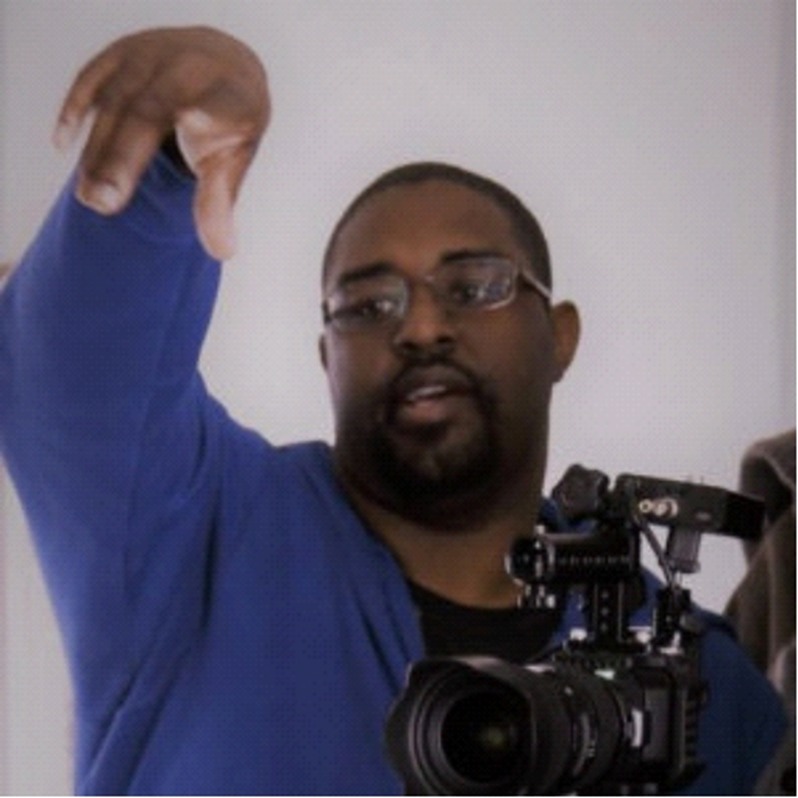
Spotlight Artist: Director Marcellus Cox
Marcellus Cox is a writer/director from Los Angeles, California with a plethora of awards for shorts that address race, religion, social, and political themes. His critically acclaimed award winning feature debut, titled ‘Mickey Hardaway‘ was released digitally by Indie Rights on July 29th. The plot sees a young sketch artist agree to an in-house therapy session with a well-renowned psychiatrist as years of physical and verbal abuse finally take a toll on him. It’s a commanding film that captures the essence of filmmaking with its narrative, storytelling, and visual crafting. We had the pleasure to speak to him about the movie, his career, and future projects.
Thank you for agreeing to catch up with Occhi Magazine. For readers unfamiliar with you and your background, what drew you to a career in film?
What drew me the most to a career in films, I really believe it started around 9/10 years old and watching Who Framed Roger Rabbit for the first time and being stunned at the power of the visual medium and the effects that it has to tell stories of all aspects of life. From that moment on I was absolutely hooked by the film bug, biting my ass pretty hard haha and I wouldn’t have it any other way.
I’ve spent the last 25 years of my life studying and perfecting my craft trying to become the best filmmaker that I can possibly be. Attending Film School at El Camino College and then venturing out on my own working on sets learning from other filmmakers watching and studying how they interact with their cast & crews. Over the course of that time, I went on to make 7 short films that have screened in over 200 International Film Festivals, Won over 150 International Film Awards, and has screened Nationwide on, SHORTS TV, Revolt TV, Crime & Investigation & PBS.
Who were your early influences and how did they impact your career?
An early influence for me was Charles Burnett the first time I saw Killer Of Sheep. Especially since it was filmed a few blocks away from where I grew up in South Central LA and seeing people even during that time going through the same struggles me and my family was going through. I loved his work and wanted to know more and studied as much of his work, and fellow filmmakers, from the LA Rebellion Film Movement like Haile Gerima, Julie Dash, Billy Woodberry, and more. Learning the importance of storytelling from a truthful perspective, never caving my artistic integrity for profit or fame. Instead using it as a teaching tool for others and sharing my views of society and where the world is headed.
As I continue to learn and study I fell in love with other filmmakers who shared the same viewpoints I did cinematically like Stanley Kramer, Robert Altman, Ingmar Bergman, Richard Brooks, and Andrei Tarkovsky to name a few. They all share the sense that nothing comes before the art, independence is the artistic key to crafting out a vision that is singularly yours and building important relationships with your cast and allowing them to have a say in the process of crafting their characters but still keeping their vision at the same time and that’s the key in my opinion in getting the best out of the work.
Your films have successfully featured in several major international film festivals. Of your many accomplishments and accolades, what are you most proud of and why?
For me all of them mean something of great importance I can never single out any of them individually it’s just like with my work I can never single out one because they all help me get to this point in my career that I’m in right now. But if I had to pick out one moment that really means something to me, I remember it was around 2019 and my parents were on vacation in Cabo. As they were coming back to their hotel room and turned their tv on, they saw my short film Rolling In The Deep airing on television out there and I really felt for the first time they could really sense that this was not just a hobby haha this was something more and real and from that point on I had there full 100% support on my film career, that’s my biggest accomplishment as a Filmmaker finally winning my parents over with my work… That was the best award I ever got.

You’re a prolific writer. Can you walk us through the process of composing a story and bringing it to the screen?
Oh Man!!! This story has been over 15 years in the making. Writing it in my senior year of High School from 2005 till early March 2020 and then the pandemic happen lol and killed those dreams. I spent the course of that time trying to learn as much as possible on mental health issues and spending time with over 90 people over the course of the years listening and writing down their stories and using them as an outline to help craft out the overall story arch for Mickey’s character as well as the entire story. At the same time, I honestly felt I wasn’t ready to tell this story from not only a skill set perspective but a level of maturity as a man to tell this story and do it justice.
Around 2020 I felt I was done with shorts and was finally ready to make it. Going through the pandemic and losing out on funding from a production company I was working with I ended up shooting a concept short which was successful and ended up getting me the funds to make the feature and here we are now. The film has far exceeded expectations, being critically acclaimed and every day it seems like it’s getting bigger and bigger and I’m beyond humbled and grateful for it all.
What would you say are the most challenging aspects of filmmaking?
This question is tricky for me because there are a lot of challenging aspects of filmmaking from finding funding to getting proper talent representation. The biggest challenge I feel for me personally is separating yourself from the Filmmakers who aren’t dedicated to the craft and putting out content one after another and it’s not good. There’s so much work that’s being put out today that’s just poorly put together and it’s driven the value of indie film down to its lowest point ever. It’s true that everyone can pick up a camera and shoot but everyone probably shouldn’t. At least without putting forth a true artistic effort in their work whether it’s good or bad. It’s clear as day that technical standards don’t matter anymore especially when anyone can just throw anything up on platforms like Tubi or Other platforms that generate money. So as an artist, the challenge is just separating and weeding your way through all the bullshit that’s being presented today. Especially for those who still see this medium as an art forum.
Please tell us more about your film Mickey Hardaway and how you came to write it.
Mickey Hardaway is a psychological drama about a young sketch artist who agrees to an in-house session with a renowned psychiatrist after years of physical and verbal abuse have finally taken a toll on him. I wanted to make and tell a real story about dreamers and the struggles that they deal with fighting for their passions but also fighting the world at the same time and the consequences that are involved for everyone. I also wanted to reveal the lackluster healthcare in America, in particular in the field of Mental Health, and how there’s a disconnect between those professionals even the ones who take their profession seriously and not providing the proper resources to help their patients who are in need of their assistance.
I went back to the script around early 2019 after finishing my Award-Winning Short I’M SORRY, I felt, artistically I was mature enough with the previous body of work I’ve done doing shorts to give this film a pulse, give it the life it needed to be taken seriously and I believe I’ve done that. Fine-tuning the script was everything to me so a good portion of 2019 was spent not only meeting psychiatrists but going to mental health institutions from Los Angeles to San Diego to Santa Barbara meeting people and hearing their stories and using it as the out layer for the majority of the film.

Please tell us more about the production team and filming schedule.
Well, working with a 30K Production Budget there really wasn’t much of a production team haha it was a very small team but the great thing about this production was even tho we didn’t have a lot, everyone involved even some of the cast help pitch in to make sure things went well. Like all sets, there were some minor struggles to shoot on time but nothing to the point where it killed the experience of making the film. And I’m beyond grateful to my team because in most situations dealing with the circumstances we had to deal with most if not all productions would have crumbled.
Film schedule-wise, we shot 12 days in two weeks Monday – Saturday all across Los Angeles from South Central Los Angeles to Santa Monica to Van Nuys to Hollywood lol we were literally all over the city filming but a lot of really great moments came from it and memories I won’t forget.
The film cleverly touches on several pertinent subjects such as fatherhood, the exploitation of artists, mental health and the sensitivities of professional counseling, and Black Lives Matter. What do you want audiences to take away from the film?
I touched on a lot didn’t I lol. With the overall viewpoint of the film, the biggest takeaway I want the audience, particularly individuals in the same predicament as Mickey is, to fight like hell to be you. Don’t ever let anyone take your satisfaction of just being yourself away from you, sounds easier said than done but it’s the truth. You have to find every way possible to maintain and get through the darkness that is life sometimes so seek out help and take care of your mental well-being.
And for people as a whole, we have to break these generations’ cycles of living. Learn to deal with this new generation as times are changing especially as parents, you have to do a better job of communicating and supporting them even if you don’t agree with the choices that allowed them to find their own way while guiding them through life.
Do you think society’s appreciation and understanding of these issues has matured over the last couple of years, particularly?
From an individual standpoint, I think some have a much more deep appreciation and sensitive understanding knowing that these are real problems that if not taken seriously can explode into a much larger situation, but as a whole across the globe, I think we still have a long way to go. We’re just in a time where people more than ever have a deeper focus on there on issues so there’s not enough putting forth the effort to want to understand them. So it’s going to be an ongoing process for as long as we live. I do feel a change in the air but not enough at the present moment that truly gives me hope.
I was drawn to the cinematography and soundtrack of the film. Can you explain your choice of music and the decision to film most of it in black and white?
The cinematography was done by the great Jamil Gooding. He visually capture the world I wanted to present. We both speak the same language cinematically so it’s a match made in heaven. We didn’t use a shortlist at all for this, when you’re dealing with two free spirits like us, the worst thing you can do is hold us down to the typical structures and boundaries that this industry places impound you. So when were both free and loose and allowed to be in the moment the best work in my opinion is captured on screen.
The reason for the film being in black & white is because there are just some things color can’t bring to life, especially with difficult feelings and subject matters such as this. Black & white brings a beautiful yet realistic image and portrait of society to life. It’s also used for Mickey’s creative process all he sees is black and white when creating his sketches, the way of the world is in art.
Music was for me in this film is a huge importance, especially for certain moments giving each of them a deeper meaning of who Mickey is and every situation he finds himself in. It’s the added lawyers to an already complicated individual who bare his soul to the audience with every waking step and breath.

The film shows the most perilous side of life and life challenges, particularly but not exclusively for creatives. Without providing spoilers, what encouraged you to conclude the movie how you have?
The life of the artist is a sacrifice. Whether it be with the art form or simply with love in your heart for another. The life of the artist isn’t a pretty one, or for the weak. I feel personally that the way of the world is a completely separate spectacle for us. Everything we do for the love of it is a sacrifice even when things seem bleak and hopeless, we sacrifice.
What other projects are you working on?
Right now I’m working on my 2nd Feature called Jefferson Street: It’s a crime drama set in East Texas 1951 following an African American Detective from Detroit down to the south to investigate the murder of his Mother at the hands of the Ku Klux Klan.
It’s being produced by one of the up and coming producers Leon Pierce Jr and LiftGate Pictures, Leon’s been producing top notch work for more than 11 years now inculding the Indie hit Welcome Matt. So I’m excited to be workig with him and bringing this important film to life and I know were going to make a great film. Were planning for production on this to begin in 2024 for a 2025 release.
Where can our readers find out more about you?
Folks can always reach out to me personally anytime at
Instagram.com/Cellusworld24
Facebook.com/marcelluscox24
Vimeo.com/cellus24



